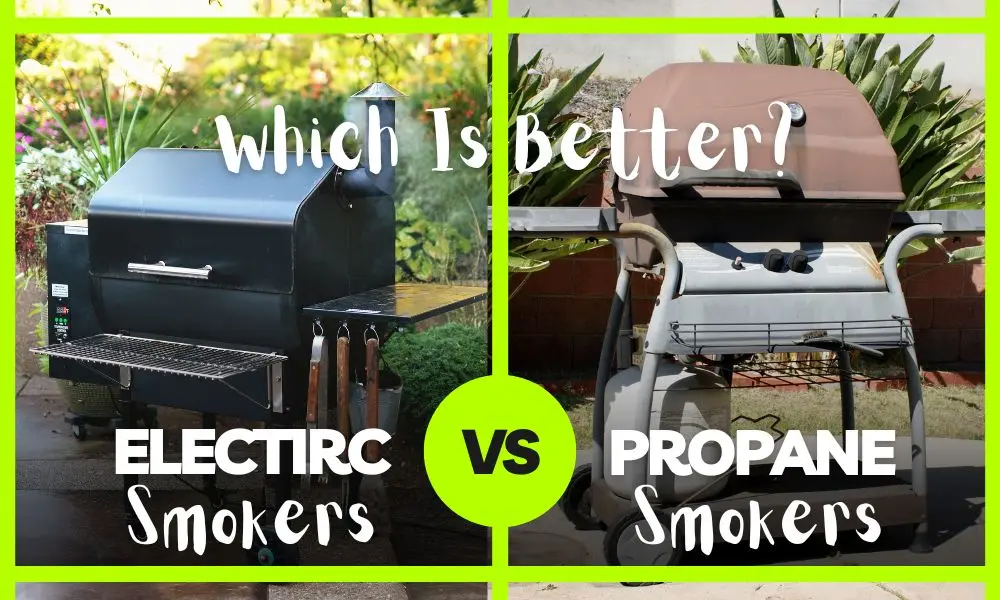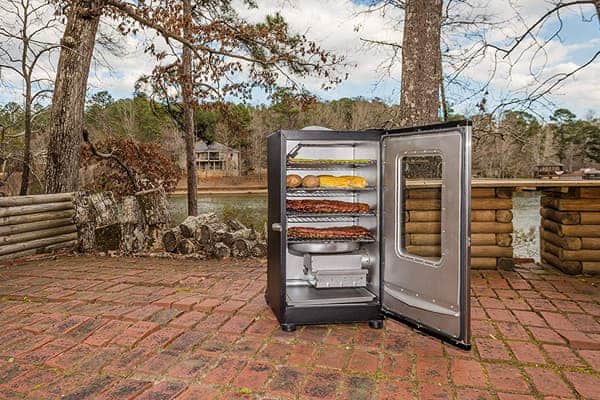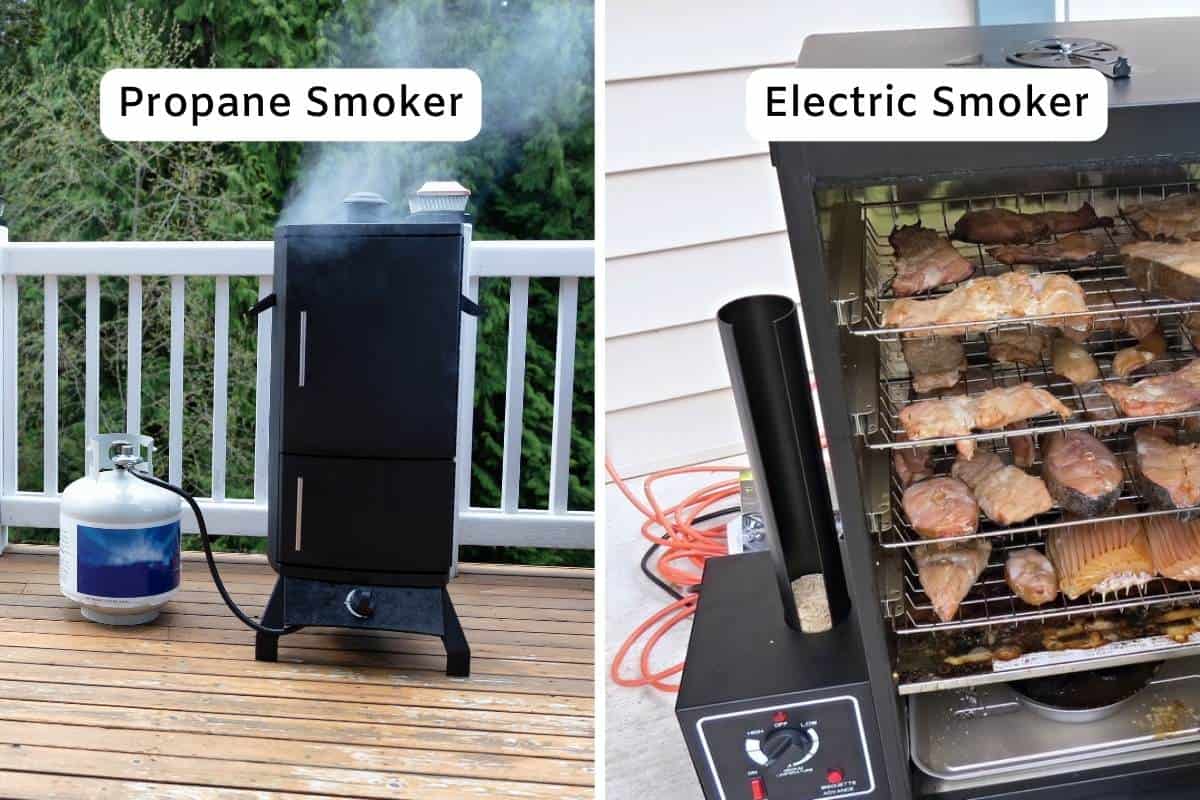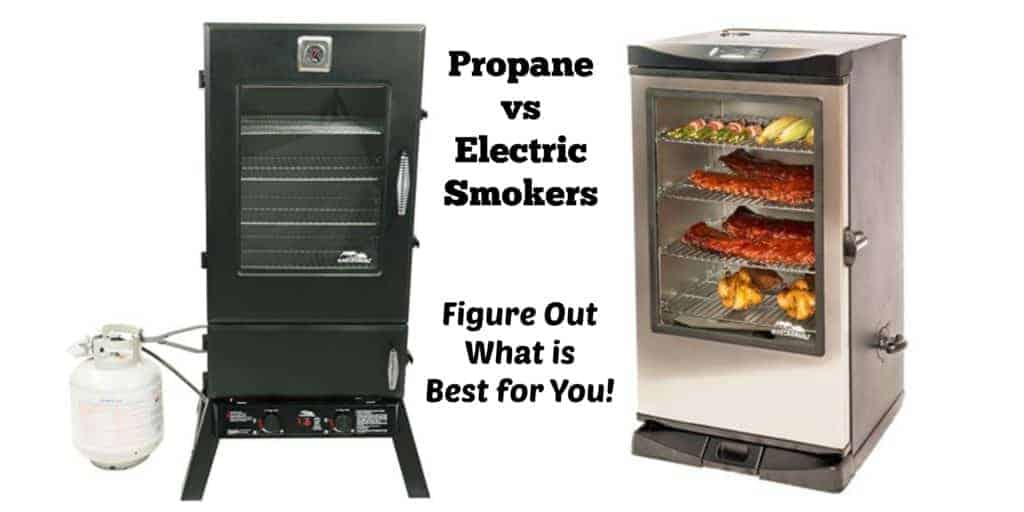The Pros and Cons of Propane and Electric Smokers
Propane smokers vs Electric smokers: Propane smokers offer portability and higher temperatures for traditional smoking, while electric smokers provide ease of use with precise temperature control and are more suited for controlled, convenient home smoking.
When it comes to smoking meat, choosing the right smoker is essential. Two popular options on the market are propane smokers and electric smokers. Both have their own set of advantages and disadvantages, so it’s important to understand the differences between them before making a decision.
Propane smokers, also known as gas smokers, use propane as their fuel source. They are typically easy to use and offer quick heating times. On the other hand, electric smokers rely on electricity to generate heat and smoke. They provide precise temperature control and consistent heat throughout the cooking process.
Choosing the right smoker for your needs depends on various factors such as convenience, temperature control, cooking time, cost, portability, maintenance, flavor, and environmental impact. In this article, we will explore the pros and cons of both propane and electric smokers to help you make an informed decision.
Pros of Propane Smokers: Quick and Easy to Use
Propane smokers are known for their ease of use. They typically come with a simple design that allows for quick and easy setup. All you need to do is connect a propane tank to the smoker, turn on the gas, and ignite the burner. Within minutes, the smoker will reach your desired temperature.
One of the main benefits of using a propane smoker is its quick heating time. Propane burners can generate high temperatures quickly, allowing you to start smoking your meat in no time. This is especially useful when you’re short on time or have unexpected guests.
Another advantage of propane smokers is their easy temperature control. Most models come with a built-in temperature gauge that allows you to monitor the internal temperature of the smoker. Additionally, they often have adjustable vents or dampers that allow you to control the airflow and maintain a consistent temperature throughout the cooking process.
Cons of Propane Smokers: Limited Temperature Control
While propane smokers offer easy temperature control, they do have some limitations. One of the main drawbacks is their limited temperature range. Propane burners can typically reach temperatures between 225°F and 275°F, which is suitable for most smoking applications. However, if you’re looking to smoke at lower temperatures for extended periods, such as for making jerky, a propane smoker may not be the best choice.
Another limitation of propane smokers is their difficulty in maintaining low temperatures. The burners are designed to generate high heat, so it can be challenging to keep the temperature consistently low for long periods. This can result in overcooked or dried-out meat if you’re not careful.
Pros of Electric Smokers: Precise Temperature Control
Electric smokers are known for their precise temperature control. They typically come with a digital control panel that allows you to set and maintain the desired temperature throughout the cooking process. This makes it easier to achieve consistent results every time you smoke.
One of the main benefits of using an electric smoker is its ability to maintain a steady temperature. Electric smokers use heating elements to generate heat, which provides consistent and even heat distribution. This is especially important when smoking larger cuts of meat that require longer cooking times.
Another advantage of electric smokers is their ability to reach lower temperatures than propane smokers. Some models can go as low as 100°F, making them ideal for smoking delicate foods like fish or cheese. This versatility allows you to experiment with different smoking techniques and recipes.
Cons of Electric Smokers: Longer Cooking Times
While electric smokers offer precise temperature control, they do have some drawbacks. One of the main disadvantages is their longer cooking times compared to propane smokers. Electric smokers typically take longer to heat up and reach the desired temperature, which can extend the overall cooking time.
The longer cooking times associated with electric smokers can be a challenge if you’re short on time or have a tight cooking schedule. It’s important to plan ahead and allow for extra time when using an electric smoker to ensure that your meat is cooked thoroughly and to your desired level of doneness.
Propane Smokers vs. Electric Smokers: Cost Comparison
When it comes to cost, both propane and electric smokers have their own considerations. Propane smokers are generally more affordable upfront, with prices ranging from $100 to $500 depending on the size and features. However, you will need to factor in the ongoing cost of propane tanks, which can add up over time.
Electric smokers, on the other hand, tend to be more expensive upfront, with prices ranging from $200 to $800 depending on the brand and features. However, they don’t require any additional fuel source other than electricity, which can save you money in the long run.
When considering the cost of a smoker, it’s important to also think about the quality and durability of the product. Investing in a higher-quality smoker may cost more upfront but can save you money in the long run by lasting longer and requiring fewer repairs or replacements.
Propane Smokers vs. Electric Smokers: Portability and Mobility
Portability and mobility are important factors to consider when choosing a smoker, especially if you plan on using it in different locations or for camping trips. Propane smokers are generally more portable than electric smokers due to their compact size and lack of reliance on electricity.
Propane smokers are often designed with handles or wheels, making them easy to transport from one place to another. They can be used in outdoor settings without the need for a power source, making them ideal for camping or tailgating.
Electric smokers, on the other hand, require a power source to operate. This can limit their portability and mobility, as you will need access to an electrical outlet or generator wherever you plan on using the smoker. However, some electric smokers come with wheels or handles for easier transportation.
Maintenance and Cleaning: Comparison between Propane and Electric Smokers
Maintenance and cleaning requirements are important considerations when choosing a smoker. Propane smokers are generally easier to clean and maintain compared to electric smokers. They typically have removable drip pans and grease trays that can be easily cleaned after each use.
Propane smokers also require less maintenance in terms of parts replacement. The main components that may need occasional replacement are the propane tank and burner, which can be easily replaced at a relatively low cost.
Electric smokers, on the other hand, require more maintenance and cleaning. They often have more complex internal components such as heating elements, water pans, and wood chip trays that need to be cleaned regularly to prevent buildup of grease and residue.
Additionally, electric smokers may require occasional replacement of heating elements or other electrical components, which can be more expensive and time-consuming compared to propane smokers.
Propane Smokers vs. Electric Smokers: Flavor and Taste
The flavor and taste of the food cooked in a smoker is an important consideration for many people. Propane smokers are known for producing a rich, smoky flavor that is characteristic of traditional barbecue. The combination of propane fuel and wood chips creates a unique flavor profile that many people enjoy.
Electric smokers, on the other hand, may not produce as strong of a smoky flavor compared to propane smokers. This is because they rely solely on electric heating elements to generate heat and smoke. However, you can still achieve a good smoky flavor by using wood chips or pellets specifically designed for electric smokers.
It’s important to note that the type of wood chips or pellets you use can also affect the flavor of your food. Different types of wood impart different flavors, so it’s worth experimenting with different varieties to find your preferred taste.
Environmental Impact: Comparison between Propane and Electric Smokers
The environmental impact of a smoker is an important consideration for those who are conscious of their carbon footprint. Propane smokers produce carbon dioxide (CO2) emissions when the propane is burned, contributing to greenhouse gas emissions.
Electric smokers, on the other hand, do not produce any direct emissions during operation. However, they do rely on electricity, which may be generated from non-renewable sources such as coal or natural gas. If you have access to renewable energy sources such as solar or wind power, using an electric smoker can be a more environmentally friendly option.
It’s also worth considering the overall energy consumption of the smoker. Electric smokers tend to use less energy compared to propane smokers, which can further reduce their environmental impact.
Which Smoker is Right for You?
Choosing the right smoker ultimately depends on your individual needs and preferences. Both propane and electric smokers have their own set of advantages and disadvantages, so it’s important to consider factors such as convenience, temperature control, cooking time, cost, portability, maintenance, flavor, and environmental impact.
If you value quick and easy use, with the ability to control temperature easily, a propane smoker may be the best choice for you. On the other hand, if precise temperature control and consistent heat are important to you, an electric smoker may be a better option.
Consider your cooking schedule and whether longer cooking times are a concern for you. If you’re short on time or have a tight cooking schedule, a propane smoker may be more suitable. However, if you have the time to allow for longer cooking times and value precise temperature control, an electric smoker may be the better choice.
Cost is another important factor to consider. While propane smokers are generally more affordable upfront, they require ongoing costs for propane tanks. Electric smokers may be more expensive upfront but don’t require any additional fuel source other than electricity.
Portability and mobility should also be considered if you plan on using the smoker in different locations or for camping trips. Propane smokers are generally more portable due to their compact size and lack of reliance on electricity.
Maintenance and cleaning requirements should also be taken into account. Propane smokers are generally easier to clean and maintain compared to electric smokers, which may require more complex cleaning and occasional replacement of parts.
Finally, consider the flavor and taste of the food cooked in the smoker. Propane smokers are known for producing a rich, smoky flavor, while electric smokers may not produce as strong of a smoky flavor. However, you can still achieve a good smoky flavor with an electric smoker by using wood chips or pellets specifically designed for electric smokers.
In conclusion, both propane and electric smokers have their own advantages and disadvantages. Consider your individual needs and preferences, as well as the factors discussed in this article, to make an informed decision. Whether you choose a propane smoker or an electric smoker, with the right techniques and recipes, you can enjoy delicious smoked meats and other foods in the comfort of your own home.
Originally posted 2024-02-07 02:55:01.





